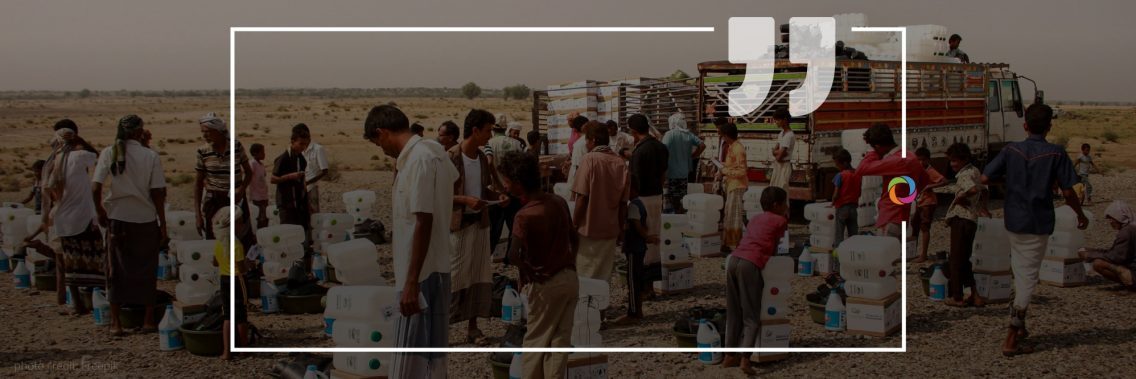‘Give a man a fish and you feed him for a day. Teach a man how to fish and you feed him for a lifetime’ – is a well-known saying that also applies to the international development sector. While the development aid provided by richer nations to poor countries is supposed to reflect an act of kindness, some critics hold different opinions about foreign aid, viewing it as a means of keeping weaker nations in economic slumber. We discussed the advantages and disadvantages of aid with several international development experts. Check their opinions below.
Key takeaways
-
- Aid involves both advantages and disadvantages
- Increasing private donor funding to the health aid sector could shift the policies from the country targeted to those of private-interest
- Aid may be beneficial when it provides the assistance needed to fill a gap in capacity, resources or expertise
- In some cases, the ‘market-based’ solutions provided by aid donors might not be advantageous for the beneficiary nation
- Aid could contribute to the crystallization and prolonging of armed conflicts
Can you identify five advantages and five disadvantages of foreign aid?

“Development aid is ostensibly a way of reducing inequality with countries more fortunate by history (e.g., former colonial powers) or geography sharing Earth’s bounty with those who have less. Globally, it can also take the form of an insurance policy against crises if we all agree to help each other. With the increasing commoditization of health, exemplified by the mass vaccination push in the COVID-19 response but which has expanded over recent decades, an increasing risk arises of re-instating colonialist mindsets and economics, with lower-income countries becoming hooked on commodities produced elsewhere, while directed ‘aid’ can undermine national autonomy. The increased involvement of private foundations and corporate entities in the decision-making processes of global health, and in the funding of international agencies such as the World Health Organization (WHO), risks tilting the balance in the control of aid and health policy from one based on country needs, and thereby their populations, to one based on private interest or those of investors. Aid can perhaps work best, ultimately for good, if it is controlled equally by all national parties but divorced from profit, as the model of WHO originally intended.”

“Taken at face value, there should be no disadvantage to ‘humanitarian aid’, as it is meant to be altruistic, unselfish support for those fellow human beings who are in need of support. In fact, humanitarian aid is a human duty much like a social safety net within a country. Aid to other countries sends a message of solidarity across borders. It can relieve suffering in times of conflict or disaster. Aid can also help to transfer know-how and technology, and help countries to leapfrog over outdated and/or polluting practices. Moreover, aid can help to build better relations among nations. But the said advantages merely reflect the ideal potential of aid. The experience of the MDGs proves that the opposite is in fact true. The countries that received the most foreign aid were the worst performers in terms of poverty reduction over the period 1990 – 2015. The UN’s 2015 MDG report conclusively demonstrates this. In a competitive, capitalist world order, the utility and intentions behind aid are far from clear. OECD documents, for example, clearly state that the intention behind aid is to support “market-based solutions” as if markets were some new OECD invention. Tied aid ensures that aid resources are bounced back to donor markets. Technologies that are given as aid are often expensive, locally unmanagable, and/or experimental, using recipient countries as testing grounds for commercial purposes. Food aid often drives local food traders and farmers out of business, exacerbating food shortages and dependency. Aid is hardly ever used to invest in infrastructure or industrial development. Instead, it is used to expand health and education services with high maintenance costs before countries are enabled to generate the wealth needed for sustainable social service provision. Locally unaffordable social services, once established, raise expectations among recipient populations and can become politically destabilising. And perhaps the most self-contradictory and counter-intuitive impact of aid is that it can convince recipients that they actually need long-term foreign aid.”

“Humanitarian aid is beneficial when it provides the assistance needed to fill a gap in capacity, resources or expertise. However, it becomes problematic when it is not strategically applied to the context in-country and in-region and is used more as a soft power tool. That gives way to inappropriate funding and the potential for ineffective oversight from the pressure donors face in meeting quotas and political expectations back home. The duration of aid is also a factor. With emergencies, aid arrives quickly, but the short-term approach negatively impacts the intermediate phase of disasters which requires long-term support around financial services, infrastructure, health systems, supply chains, and legal access to restore livelihoods. A similar situation appears with project-based aid and whether donors have the fiscal and operational stamina to maintain their levels of support within the locally contextualized timeframe needed to solve the issue at hand. Lastly, aid is a crowded field. We should all ask whether consolidation is needed to provide a more cohesive and collaborative approach to realize short, medium, and long-term improvements. The mission of every aid (and charity) organization is to solve a problem, not to continue a problem.”

“Humanitarian aid is essential as it enables populations affected by crises to have the necessary assistance that which they need right now, this being vital for vulnerable people. Seen from this angle, it is undeniably advantageous. However, while it is necessary and even imperative, it could have both positive and negative consequences. Let’s start with the benefits. Humanitarian aid saves lives, alleviates the suffering of victims, preserves dignity, helps recovery, and strengthens ties between the parties. Then let’s talk disadvantages. It (1) contributes to the crystallization and prolonging of armed conflict, promotes dependence, contributes to the destruction of the local systems and increases the cost of living.”
* The opinions expressed in the article belong to experts and do not necessarily reflect DevelopmentAid’s position.
Check out more than 400 job opportunities in the humanitarian aid sector here.

